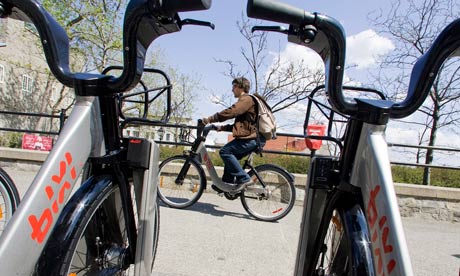
"Bixi bikes are for short hops, not days out." This was the advice I was given about Montreal's hugely popular bike share scheme on my first day in the city. It came from André Giroux, who was clearly keen to make the distinction between this new scheme and his own 16-year-old cycle hire shop, Ça Roule. "Tourists get confused," he sighed. "They try to take the Bixis on the out-of-town routes for hours on end, then wonder why they get hit by a huge bill."
Today, those same Montreal-designed public bikes are rolling around London and with them come the same misunderstandings. Some of the UK press is up in arms about £50 charges for 24 hours' use, but, as Montrealers know, no one is supposed to hang on to one bike for this long. The key to affordable usage is to dock the bike for five minutes between each "free" 30-minute session and – bingo – no extra charges. This is provided that you've paid the subscription charge, which in Montreal is C$78 (about £50) for a year, or C$5 (£3) for a day.
With their heavy frames and three-gear system, the bikes should have "short hop" written all over them. Are Londoners already struggling to see beyond the heavy-handed Barclays branding?
The name has certainly been the most controversial change made for the UK market. This aside, more than 40 practical modifications have been made to the Montreal Bixis in preparation for hitting London's roads. Brakes have been reversed, adjustable seats made higher and, for added safety, the dynamo lights will now stay on even when the user stops.
I've been putting Montreal's Bixi system, which launched last spring, to the test for the past fortnight. During this time, I have abandoned the city's perfectly serviceable metro system and I haven't set foot on a bus. I have barely even set foot on my feet. Why walk when you can Bixi? My online statistics tell me I have taken 36 trips, totalling 114km and reducing greenhouse gas emissions by 29kg. That last figure may be debatable, but there is no denying the feel-good factor.
The Montreal set-up is highly impressive. The annoyance felt when you come across an empty rack is soon offset by the knowledge that there is always another station just around the corner - there are 3,000 bikes at 300 stations. It's also a very bike-friendly city. There are abundant cycle paths (more than 560km across the city at large); downtown is compact; and the traffic has neither the volume nor the aggression found in London.
"The Bixi has been adopted into the city's DNA," says company chairman Roger Plamondon. Residents are already taking proximity to Bixi stations into account when renting homes, or arranging to meet for lunch at cafes near docking stations. Surely the name helped. The sweet-sounding Bixi (bike/taxi) is easy to take to heart; it has even inspired a mock-reggaeton anthem.
Plamondon recognises that making the system work in London will be a learning curve and making changes as they go along won't be quite so easy. In Montreal, the semi-permanent docking stations are solar-powered and can easily be moved as demand dictates. In London, they are obliged to be hooked up to a fixed electric supply.
The London bikes are only currently available to registered subscribers for annual, weekly or 24-hour access as they break the system in. The programme for tourists and occasional users is said to be "coming soon".

